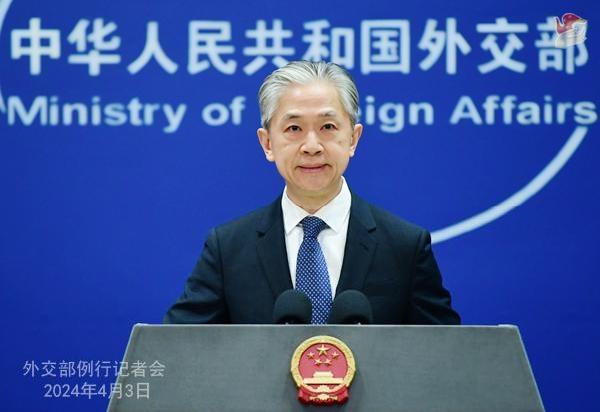
 0 Comment(s)
0 Comment(s) Print
Print E-mail Xinhua, April 4, 2024
E-mail Xinhua, April 4, 2024

Chinese Foreign Ministry spokesperson Wang Wenbin speaks at a regular press conference in Beijing, April 3, 2024. [Photo/fmprc.gov.cn]
A Chinese Foreign Ministry spokesperson on Wednesday answered media questions on the phone talks between Chinese President Xi Jinping and U.S. President Joe Biden.
According to the U.S. side, during the telephone conversation between the Chinese and U.S. presidents on Tuesday, President Biden mentioned Ren'ai Jiao, Hong Kong, Xinjiang and Xizang. The U.S. side also urged China to stop supporting Russia and play a bigger role in the Korean Peninsula nuclear issue.
In response to a related query, spokesperson Wang Wenbin said at a daily news briefing that during the call, the Chinese side stressed that China has indisputable sovereignty over Nansha Qundao and its adjacent waters. The sovereignty covers the islands, reefs, shoals and cays of Nansha Qundao, including Ren'ai Jiao.
The root cause for the Ren'ai Jiao issue is that the Philippines has repeatedly gone back on its words and tried to build permanent outposts on the uninhabited reef which belongs to China, in an attempt to permanently occupy Ren'ai Jiao, which is illegal, Wang noted.
The United States is not a party to the South China Sea issue, and should not intervene in matters between China and the Philippines. China has strong will and resolve to safeguard its territorial sovereignty and maritime rights and interests, he said.
"The Chinese side stated clearly that Hong Kong is China's Hong Kong, and Hong Kong affairs are purely China's internal affairs," Wang said.
Completing the legislation on Article 23 of the Basic Law of Hong Kong is the constitutional responsibility of the Hong Kong Special Administrative Region for safeguarding national security. It will help protect the fundamental wellbeing of all Hong Kong residents, as well as the interests of investors from all over the world in Hong Kong. It will not at all undermine the rights and freedoms that Hong Kong residents enjoy in accordance with the law, Wang said.
The United States needs to respect China's sovereignty and the rule of law in Hong Kong, and should not disrupt, still less interfere in the process, he added.
"The Chinese side stressed that issues related to Xinjiang and Xizang are China's internal affairs," Wang said, adding that no country has a monopoly on human rights. China attaches great importance to the protection of human rights. The people of a country are best positioned to judge the human rights conditions of the country.
China would like to engage in exchanges with the United States on human rights on the basis of mutual respect, but we firmly oppose interference in China's internal affairs under the pretext of human rights, he said.
"On the Ukraine crisis, China's position has been consistent, clear and transparent," Wang said, adding that there is a risk that the crisis will further deteriorate and escalate, and efforts should be made toward deescalation to bring the conflict to an end through negotiation rather than fighting. There should be no winner and loser in a political settlement. Rather, it should be peace that prevails. China will continue to play a constructive role to that end.
China is neither the one that created the conflict nor a party to it, and has never provided lethal weapons or equipment to any party, Wang stressed.
"We did not and will not seek gains from the conflict. Other countries should not smear and attack normal relations between China and Russia, should not undermine the legitimate rights of China and Chinese companies, and should not shift blame to China wantonly and provoke camp confrontation," he said.
The Korean Peninsula issue has dragged on for years, and its root cause is clear. The imperative now is to desist from acts of deterrence and applying pressure, and move out of the spiral of escalating confrontation, Wang said.
The fundamental solution lies in resuming dialogue and negotiation; addressing the legitimate security concerns of all parties, especially those of the DPRK; and advancing the political settlement of the Korean Peninsula issue, Wang noted.
"Turbulence and fighting in Northeast Asia will be in no one's interest. The core of the Korean Peninsula issue lies in the conflict between the United States and the DPRK, and it is the United States who holds the key to the issue," he said.
Go to Forum >>0 Comment(s)